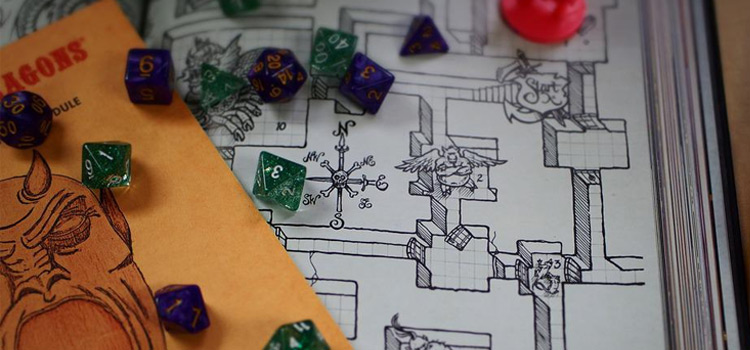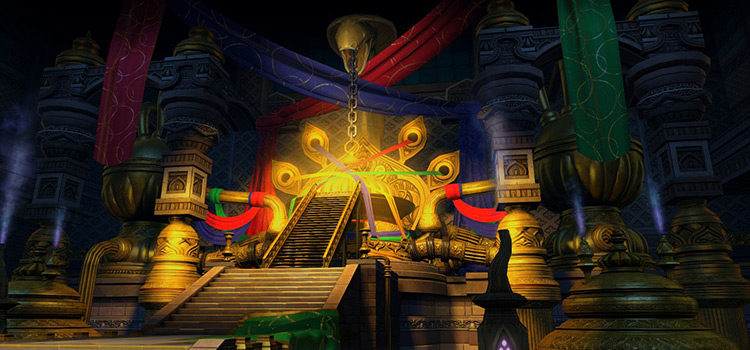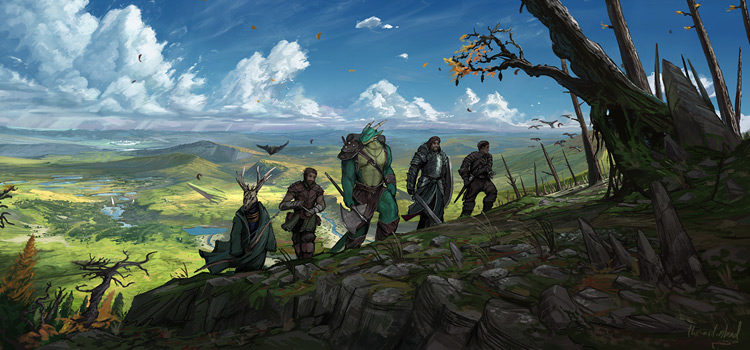Expert Tips for New DMs: D&D Interest Surges Thanks to Stranger Things
This post may contain affiliate links. If you buy something we may get a small commission at no extra cost to you. (Learn more).
All caught up with Stranger Things and now inspired to play Dungeons & Dragons (D&D) to fill your time? Well you’re not alone.
We’ve found that there’s been a 35% increase in worldwide searches of Dungeons & Dragons since the 2016 release of Netflix’s Stranger Things. Not only that, but according to Google Trends, US searches of ‘Dungeons & Dragons online’ have increased by 400% in the past 90 days* – a period that covers the release date of Stranger Things Season 4.
And if you’re starting out in the game, you’ll need to have a Dungeon Master (DM), someone to control the pace of the story and referees the action as it unfolds.
If you’ve been nominated by your friends to act as the DM, then don’t worry – as we have you covered! The prospect of running a game can seem daunting at first, but with a bit of preparation and a few simple tricks, you’ll be acing your first DM session in no time.
We’ve partnered with an experienced DM, Gemma Grover, who has 20 years’ experience in the game, to share her top tips for bossing the DM role:
1. Start small
Start with one session. These mini-adventures, often called one-shots, are a great way for everyone to try things out without a lot of commitment.
One-shots can still include great characters, great settings, and a lot of fun adventure without planning to meet every Saturday for the next two years.
A single afternoon or evening can leave you with amazing memories, and if the group doesn’t gel well or it turns out someone doesn’t want to play anymore, no one is left in an awkward situation. This also gives you as the DM a chance to try out different types of settings (dungeon versus urban versus forest, for example) or styles (comedic versus horror versus political).
And for players who have a dozen character ideas, a few one-shots will let them try out at least a couple!
2. Start simple
If you’re anything like me, you might have a million ideas for epic campaigns with worlds and characters that you’ve been thinking about for a long time. So, what I’m about to say might sound counterintuitive but…. don’t use them for your first adventure.
Chances are, these ideas mean a lot to you and they are probably pretty complex – a recipe for a challenging time for a bunch of newbies.
Instead, pick one story and one single Big Bad Enemy. Choose a single setting where the players can reasonably get from Point A to Point C, with or without visiting Point B. With any luck, your group will keep playing and you’ll have the opportunity to roll out the epic adventure of your dreams once everyone has settled in.
3. Don’t go it alone
It’s easy to feel like you need to homebrew everything (D&D lingo for writing it all yourself!)
While this can be a lot of fun, it can also be overwhelming. There are so many pre-made resources and modules that you can rely on to make it easier and more manageable.
New DMs often try to make everything up for their first session, but this can make everything so much harder than it needs to be. Modules and adventures that you can pick up ready-made have often been play-tested, meaning that you don’t need to worry about whether something is overpowered, underpowered, or just plain broken.
4. Plan ahead
Those D&D books are hefty, and every second you spend flipping through one looking for spell details or a rule will feel like 5 agonizing, anxious minutes.
I like to pull every spell my NPCs (non-playable characters) can cast, the monster stat blocks, and the details of any tricky mechanics before we play. I like to screen-cap the stat blocks from digital sources, combine them in encounter order in a document and either print them out or have them ready digitally. That little bit of prep work also gives me a chance to see just how much I have planned, and whether it’s a reasonable amount for the time we have planned.
I also like to break my sessions and one-shots into “Acts” – what are the main points I’m trying to hit, and is it evenly paced? Everyone will need snack and toilet breaks, and planning the sessions into these smaller Acts also leaves good timing to take breaks. I try not to plan for an Act to take more than 2.5 hours.
While it’s important to know your own characters, you do NOT need to know everything about the players’ characters.
If they cast a spell or use an ability you don’t know, ask them to describe it or read it from the book. “How does that work?” is a valid question and lets the players teach each other about the game too!
5. Don’t get too attached
Your players will be chaos demons – literally every player is.
If you meticulously plan a story that must go in order and hit every detail, you will be disappointed and perhaps frustrated. Every player will go rogue – and it’s very possible that the whole party will choose to journey south after you’ve planned a snowy northern adventure.
Pick two or three elements that are must-haves and think about a few ways you can encourage the players to go that way. Otherwise, just be flexible and know that when players miss huge chunks of the story that you can just include them in a later session or game if you really loved them.
6. Include variety
Some players love combat, some love roleplaying, and some love mechanics.
If you are just starting out, especially with a group of new players, try to include a little bit of everything so you and your players get to find your style. Remember that combat will be very clunky at first while folks figure out how to play, roleplaying will be awkward and chaotic as the group gels, and mechanics will be misplayed more often than not, so having the chance to practice all these things will benefit everyone.
My trick is to try to include some mini-games with new players – whether that be festival-style trials, tavern-based mini encounters, or dungeon puzzle rooms.
Arm-wrestling battles, storytelling challenges, potion-making feats – all of these give players a chance to try out lots of skills to see what they love most and to make sure that no character’s special traits get overlooked.
7. Let creativity reign supreme
I look to improv for guidance here – I always try to say “yes and” rather than no when my players are trying something wacky. The “and” can have some gnarly consequences, or the trick might require a roll of 20 to be successful, but giving players the chance to infuse the story with their own ideas is crucial to a good time.
Sometimes, this also means being creative with the numbers. This is where I sometimes disagree with other DMs who believe that numbers should never be fudged, but I believe that fun and creativity are valid reasons to fudge numbers slightly.
A great DM once taught me to challenge players to describe things dramatically in order to get that extra point of damage to kill an enemy or hit that almost-there skill check, and let me tell you, every player loves the chance to narrate their way into snatching victory from the jaws of defeat. I use that tick all the time.
8. Be fair
Fudging the numbers a little is totally okay if you are doing it for a good reason, but it needs to be fair – every player needs the same chance to do so, and you shouldn’t be doing it to favor your own NPCs much.
Consequences and risk are an important element of fun – if players don’t feel like they might actually lose, either individually or as a team, that removes a lot of the excitement. You should plan out what “failure” looks like for every major element of your session, and it should be possible.
As devastating as a Total Party Kill can be, the fear of it can help players make reasonable choices and feel proud of their victories. No player should be immune to Bad Things Happening.
9. Address problems before they start
DMs end up the unofficial leaders of any group – which often means that you’re the one who has the responsibility to address issues when they come up.
That can mean ending bickering between players, cracking down on a player who wants to bend the rules, or asking the party to pay attention when things get a bit too chaotic.
It’s easy to be afraid to do that when you’re new to the role, but trust me – saying something early on will help stop problems before they implode. Hopefully, you’ll have the help of the players and everyone will be working together to make sure the sessions remain fun for everyone.
10. Listen
Your players will have a million opinions on things – and that can be as simple as how they respond when monsters are revealed or combat ends.
Pay attention to those responses: are they excited? Engaged? If they are liking what’s happening, that’s a great cue about what types of play they enjoy.
Listen to those off-hand comments too, whether that’s a player complaining that they never get to use a specific spell, or that they don’t know why they took a particular skill. Use that info to create scenarios where they WILL use those spells or skills – those moments are ones that can really make everyone feel included. And, if they directly complain that they don’t like someone, don’t see that as an attack on you – use that info to change and adapt as needed.
As a DM, you get the chance to create whole worlds of fun for you and your friends. As intimidating as that can be, just remember that every person around the D&D table has a part to play in making the sessions a success, and don’t be afraid to ask for help.
Every great DM was new at one point.
Happy Adventuring, New Dungeon Master!
*Stats taken on on 4th July 2022 and based on the past 90 days (a period that covers the release date of Stranger Things Season 4) – compared with the previous period.






